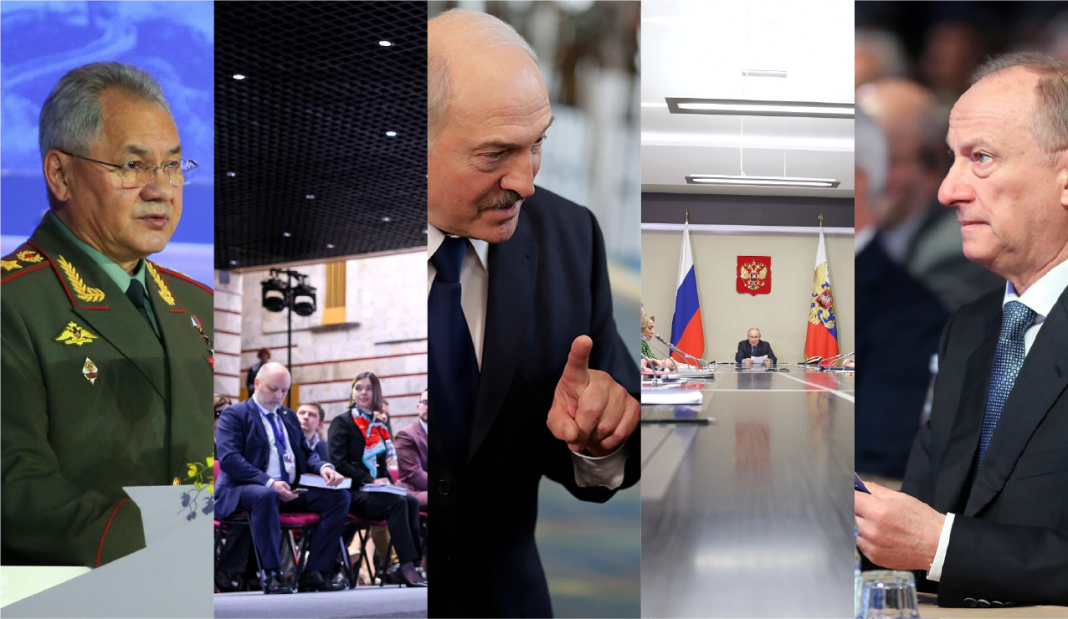This report describes the key events that significantly impacted Russia’s political, economic, and social processes.
Based on the results of the past week, the following trends can be summarised:
- Russia is demonstrating in every possible way that events in the Middle East are the focus of attention of the country’s leadership, although, in reality, the Russian Federation is deprived of the opportunity to influence the ongoing processes actively. Moscow may be waiting for the situation around the confrontation between Israel and Hamas to reach a certain critical point. Then, Russia will come up with a specific package of peace proposals. This is a long-known tactic: let others try; our solution will come later. This strategy, according to the Kremlin strategists, should bring maximum efficiency to Russia. Although it is possible that while Russia waits, many issues will be resolved without its participation.
- Recently, for the first time, Putin decided to evaluate the events of the last decade – especially in relations with Ukraine. Putin actually admitted that Russia committed acts of aggression in 2014 and 2022 without having sufficient grounds for accusations against Ukraine, but only because Russia “felt” that Ukraine could pose a threat. That is, it was an indicative “punishment” of Ukraine.
- Shoigu has recently been strengthening his position; Putin trusts him, and he represents Russia in important negotiations (not long ago, he headed the Russian delegation in Pyongyang). At the same time, Shoigu is still a stranger to most formed clans and groups around Putin. He can only rely on the authority of Putin himself and partly on the group of Sergei Chemezov (with which Shoigu has built a partnership).
This report highlights the following topics that were most relevant for Russia during 30th October – 5th November:
1. Meeting of Putin with members of the Security Council, Government and leadership of law enforcement agencies;
2. Telephone conversation between Putin and President of Belarus Alexander Lukashenko;
3. Meeting of Putin with members of the Civic Chamber;
4. Shoigu’s visit to China;
5. Patrushev’s statement about US involvement in undermining the Nord Streams.
This Content Is Only For Subscribers
- Meeting of Putin with members of the Security Council, Government and leadership of law enforcement agencies
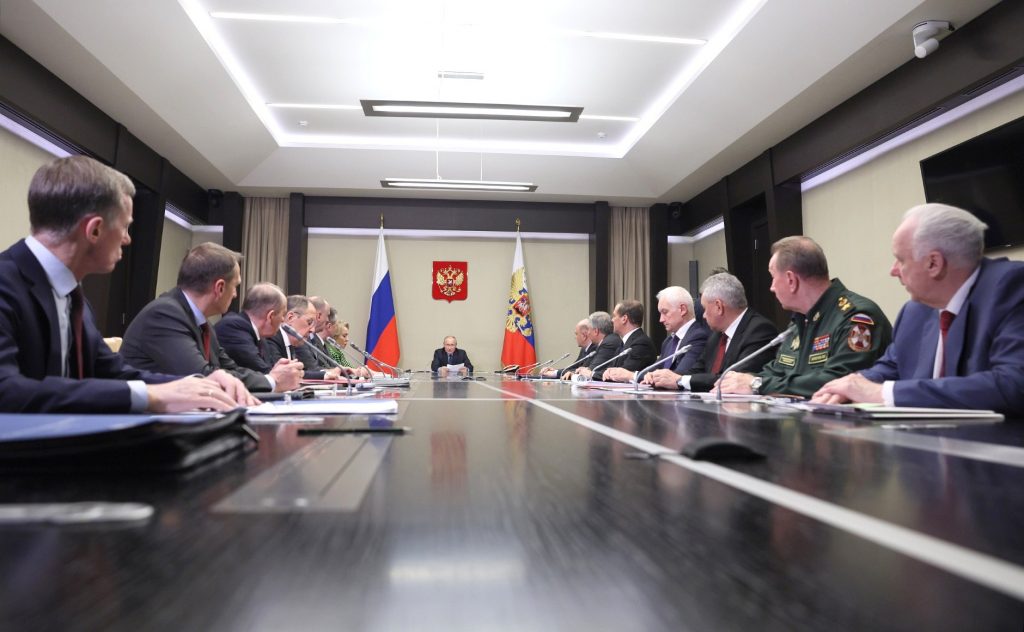
On Monday, October 30, Vladimir Putin held a meeting with members of the Security Council, the Government and the leadership of law enforcement agencies. According to official information, during the meeting, the situation in the Middle East, protecting citizens’ rights and public safety, civil peace and interethnic harmony, including considering external threats, were discussed. The meeting participants also heard a report from Sergei Shoigu following his visit to China.
The meeting was attended by Prime Minister Mikhail Mishusti, Chairman of the Federation Council Valentina Matvienko, Speaker of the State Duma Vyacheslav Volodin, Prosecutor General Igor Krasnov, Deputy Chairman of the Security Council Dmitry Medvedev, Secretary of the Security Council Nikolai Patrushev, First Deputy Prime Minister Andrei Belousov, Minister of Foreign Affairs Sergei Lavrov, Defense Minister Sergei Shoigu, FSB Director Alexander Bortnikov, Director of the Russian Guard Viktor Zolotov, SVR Director Sergei Naryshkin, Chairman of the Investigative Committee Alexander Bastrykin, as well as First Deputy Minister of Internal Affairs Alexander Gorovoy.
Key theses of Putin’s speech:
- “Those behind the conflict in the Middle East and other regional crises will use their destructive consequences to sow hatred and pit people around the world. This is the true selfish goal of such geopolitical puppet masters.”
- “We remember how the current round of the Middle East crisis began – with a terrorist attack against civilians of Israel and other countries on the territory of this state. We also see that instead of punishing criminals and terrorists, unfortunately, they began to take revenge on the principle of collective responsibility.”
- “We must clearly understand who is really behind the tragedy of the peoples of the Middle East and other regions of the world, who is organising the deadly chaos, and who benefits from it. Today, in my opinion, this has already become obvious to everyone – customers act openly and brazenly.”
- “It is the current ruling elites of the United States and their satellites that are the main beneficiaries of global instability. They extract their blood rent from it. Their strategy is also obvious. The United States as a world superpower – everyone sees and understands this, even based on trends in the global economy – is weakening and losing its position. The American world, with one hegemon, is collapsing, disappearing, gradually but steadily becoming a thing of the past.”
- “Today, Russia is not just actively participating in the formation of a new, fairer, multipolar world with equal rights and opportunities for all countries and civilisations. “We are not only one of the leaders of this objective historical process, but I will say more, and everyone knows this: for our future, for the principles of a fair world order, for the freedom of countries and peoples, Russia is fighting on the battlefield.”
- “I will repeat: behind the tragedy of the Palestinians, and behind the massacre in the Middle East as a whole, behind the conflict in Ukraine, behind many other conflicts in the world – in Afghanistan, Iraq, Syria and so on – are the ruling elites of the United States and their satellites. This is already obvious to everyone. It is they who plant their military bases everywhere, constantly use military force on occasion and without any occasion, and send weapons to conflict areas.”
- “Without achieving results on the battlefield, they want to split us, as far as Russia is concerned, from within, weaken us and sow confusion. They are also not satisfied with any participation of Russia in solving global and regional problems, including the Middle East settlement. They are generally unhappy when someone acts or speaks not according to their orders. They believe only in their exclusivity, in that everything is allowed to them.”
- “In our approaches to the situation in the Middle East, unlike the West, there has never been self-interest, intrigue or a double bottom. We have stated and are declaring our position openly, and it does not change from year to year. The key to resolving the conflict is the creation of a sovereign, independent Palestinian state, a full-fledged Palestinian state.”
- “You need to know and understand where the root of evil is, where this very spider, which is trying to entangle the entire planet, the whole world with its web and wants to achieve our strategic defeat on the battlefield, uses the people it has fooled for decades on the territory of today’s Ukraine.”
- “The events in Makhachkala last night were inspired, including through social networks, not least from the territory of Ukraine, by the hands of agents of Western intelligence services. In this regard, I want to ask the question: is it possible to help Palestine by trying to attack the Tats and their families? The Tats, by the way, are the titular nation in Dagestan.”
- “I want to draw the attention of the heads of all regions, heads of law enforcement agencies and special services to the need for firm, timely and clear actions to protect the constitutional system of Russia, the rights and freedoms of our citizens, interethnic and interreligious harmony.”
Outcomes and outlook:
Russia is showing in every possible way that events in the Middle East are the focus of the attention of the country’s leadership. In reality, the Russian Federation is deprived of the opportunity to influence the ongoing processes actively. Moscow may be waiting for the situation around the confrontation between Israel and Hamas to reach a certain critical point. Then, Russia will come up with a specific package of peace proposals. This is a long-known tactic: let others try; our solution will come later. This strategy, according to the Kremlin strategists, should bring maximum efficiency to Russia. Although it is possible that while Russia waits, many issues will be resolved without its participation.
- Telephone conversation between Putin and President of Belarus Alexander Lukashenko
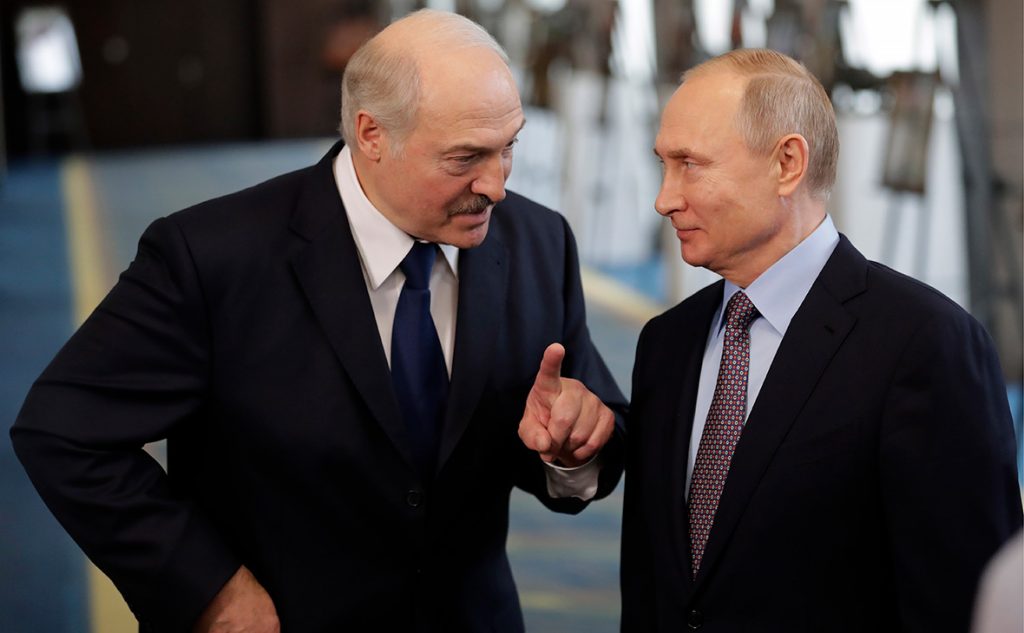
On Wednesday, November 1, Vladimir Putin spoke with the President of Belarus, Alexander Lukashenko. According to official information, during the conversation, they discussed preparations for the next meeting of the Collective Security Council of the Collective Security Treaty Organization, which will take place on November 23 in Minsk. The parties also discussed the further development of bilateral interactions within the framework of union integration, including energy, transport and high technology.
Outcomes and outlook:
A “general” call can have far-reaching consequences. Integration processes between Russia and Belarus continue to develop. It is quite possible that the expected meeting of the leaders of the CSTO states in Minsk on November 23 will bring a significant result: the expected presence of Vladimir Putin at the meeting may be accompanied by several important statements regarding the future of the Union State and the CSTO as a whole.
- Meeting of Putin with members of the Civic Chamber
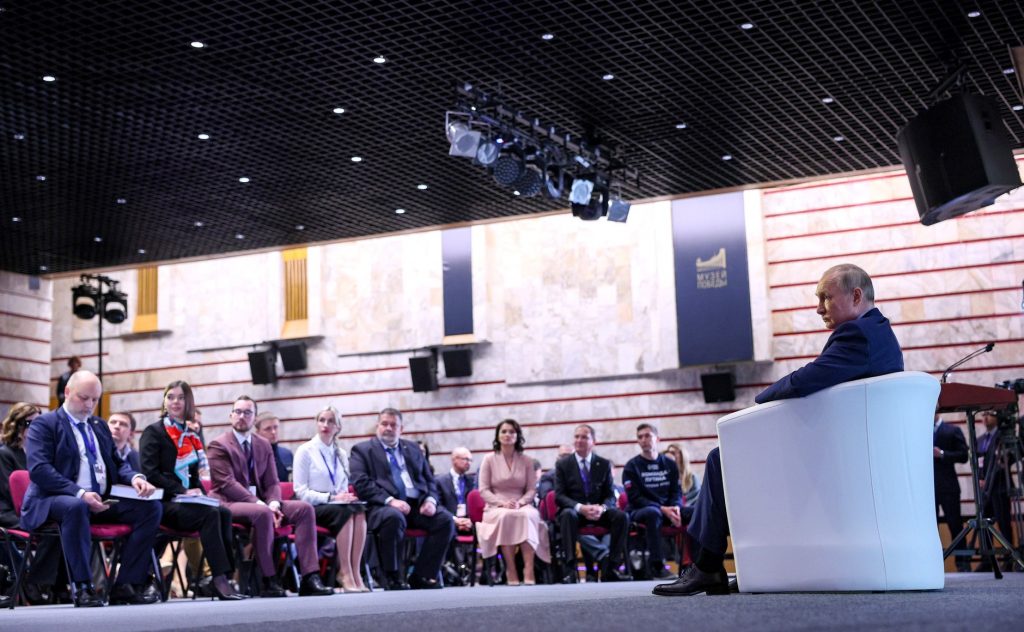
On Friday, November 3, at the Victory Museum in Moscow, Vladimir Putin met with members of the Public Chamber of the Russian Federation and chairmen of public chambers of the constituent entities of the Russian Federation. During the meeting, Putin, in his usual manner, drew historical parallels, interpreting several historical facts, and voiced many theses regarding the West, Ukraine and Russia’s plans. The Russian president also touched upon domestic political issues, focusing on economic sustainability and the absence of unemployment.
Key theses:
- “This year, our GDP growth will be 2.8–2.9, or even three per cent, while in the leading economies of Europe, it will be minus, small, but minus. And they suffer, and real problems arise. We are not happy about this, but we are simply stating the fact itself.”
- “This means that the economy and real production, which should be connected with the world economy, of course, there is no other way in the modern world, but it [the economy] must [be] self-sufficient in key components, one that allows the country not only survive but also move forward.”
- “There was no Ukraine as part of the empire; there were regions, and in the 16th century, it itself came; Ukraine consisted of three regions: Kyiv and the Kyiv region, Zhytomyr, Chernihiv – that’s all. It came from the Polish-Lithuanian Commonwealth, from Poland voluntarily. We have a letter in our archives—I have already spoken about this—a letter: we, the Russian Orthodox people, appeal to Moscow, the Tsar, and so on. Trying to defend their rights, they addressed the same thing to Warsaw: we, Russian Orthodox people, ask to preserve this, demand, and so on.”
- “As it turned out, having signed the so-called Minsk peace agreements with us, they were not going to implement them, as it turned out later, and moreover, they refused to implement them publicly. Moreover, they began to drag this entire territory into NATO – brazenly, not paying attention to any of our protests, not paying attention to our position, as if we did not exist at all. This is what lies at the centre of the conflict that is happening today. This is what is causing this conflict.”
- “Of course, if we had developed relations with fraternal Ukraine – I still say “fraternal”, meaning that our ethnic composition is fraternal in the literal sense of the word – normal, in a modern, friendly way, in It wouldn’t even occur to anyone to commit actions, for example, related to Crimea.”
- “How? If everything were fine there, if the Russian people, the Russian language and culture were treated normally, there wouldn’t have been these coups d’etat. Would it have occurred to anyone in Russia to act in Crimea the same way we acted? Of course not, people had to be protected from this Nazi scum. What should we do? They simply presented us with a choice in which we could do nothing else but stand up for the people living there. The same thing then happened with Donbas and Novorossiya.”
- “You know, we and Russia have a lot of problems. We in Russia – and throughout the world [are] fighting corruption. But the way Ukraine lived within the framework of Ukrainian corruption, there is nothing like it in the world, I assure you. Not in the world! You can believe me; I communicated closely with former leaders.”
- “Now they say that weapons are appearing in the Middle East from Ukraine. Of course, it does. Because they do sell. And they sell it to the Taliban, and from there, it goes anywhere else. Everything is bought and sold.”
- “We had no other choice. Because before you decide to uncover the machine gun, you need to think about whether you can do without it. No, unfortunately, this could not be done. Why? Because we have already been attacked.”
Outcomes and outlook:
Putin’s speech at the meeting of the Public Chamber was of a programmatic nature. For the first time, he decided to evaluate the events of the last decade, especially in the context of relations with Ukraine. Putin admitted that Russia committed acts of aggression in 2014 and 2022 without having sufficient grounds for accusations against Ukraine, but only because Russia “felt” that Ukraine could pose a threat. That is, it was an indicative “punishment” of Ukraine.
An important point: Putin began to send conciliatory phrases regarding the “brotherly” people, making it clear that he was ready for the negotiation process, but, as is evident from his speech, two points will be fundamental – guarantees of Ukraine’s non-entry into NATO and regime change in Kyiv. At the same time, Russia’s statements and actions regarding Ukraine show that the Russian Federation will not raise the issue of territorial concessions during possible negotiations: Russia continues to consider all the territories conquered in 2014–2023 as its own and will insist on this. Particularly significant is the railway construction along the Sea of Azov to Crimea, which begins in November 2023. Lengthy excursions into history are not new for Putin, just like a rather free interpretation of certain historical events. Still, to this extent, Putin remains true to himself: there was no Ukraine; the Bolsheviks invented it, and only Russia has the right to decide whether Ukraine should be an independent state. That is, essentially, nothing has changed.
- Shoigu’s visit to China
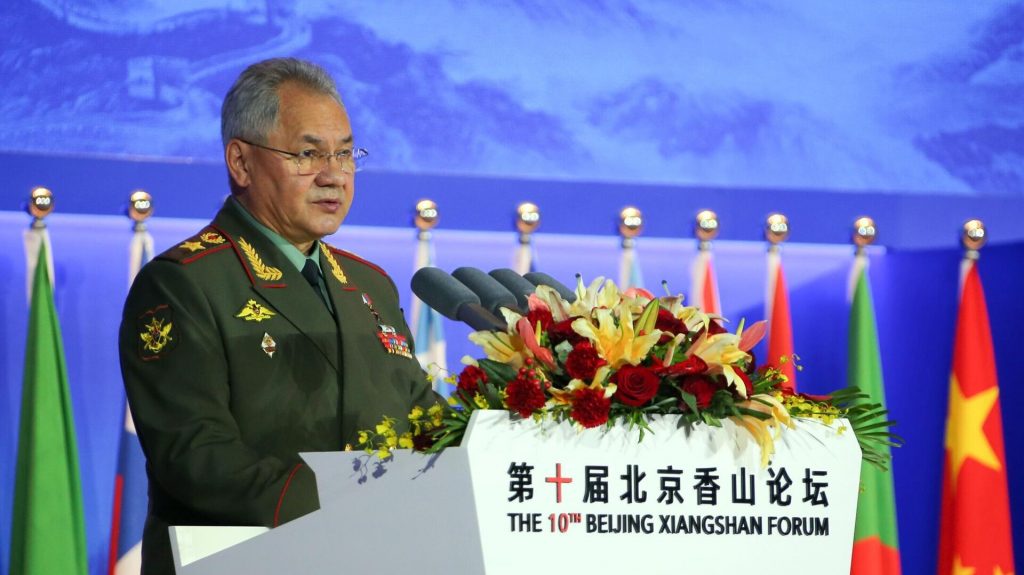
On Monday, November 30, Russian Defense Minister Sergei Shoigu arrived in the capital of China on a working visit, during which he took part in the 10th Beijing Xiangshan Forum and held several bilateral meetings. In particular, Shoigu held talks with the Deputy Chairman of the Central Military Council of the People’s Republic of China, Zhang Yuxia and also made a report at the forum.
The forum was also attended by senior management representatives, ministers of defence and leading experts from the Asia-Pacific region and several European countries. The Beijing Xiangshan Forum, organised by the Chinese Association of Military Sciences and the China Institute of International Strategic Studies, has been held in China since 2006.
Outcomes and outlook:
Sergei Shoigu has become such a frequent guest in Beijing that many experts (including in Russia) are pondering the question: has Putin decided to increase Shoigu’s status or even appoint him as his successor? Shoigu has recently been strengthening his position, Putin trusts him, and he represents Russia in important negotiations (not so long ago, he headed the Russian delegation in Pyongyang). At the same time, Shoigu is still a stranger to most of the formed clans and groups around Putin and can only rely on the authority of Putin himself and partly on the group of Sergei Chemezov (with which Shoigu has built a partnership). Regarding the Chinese visit, Shoigu is establishing relations with the elites in Beijing and trying to be “one of his own” for them, especially given the reshuffles in the PRC military department and the need to establish horizontal relations with the new leadership of the PLA and the Ministry of Defense.
- Patrushev’s statement about US involvement in damaging the Nord Streams.
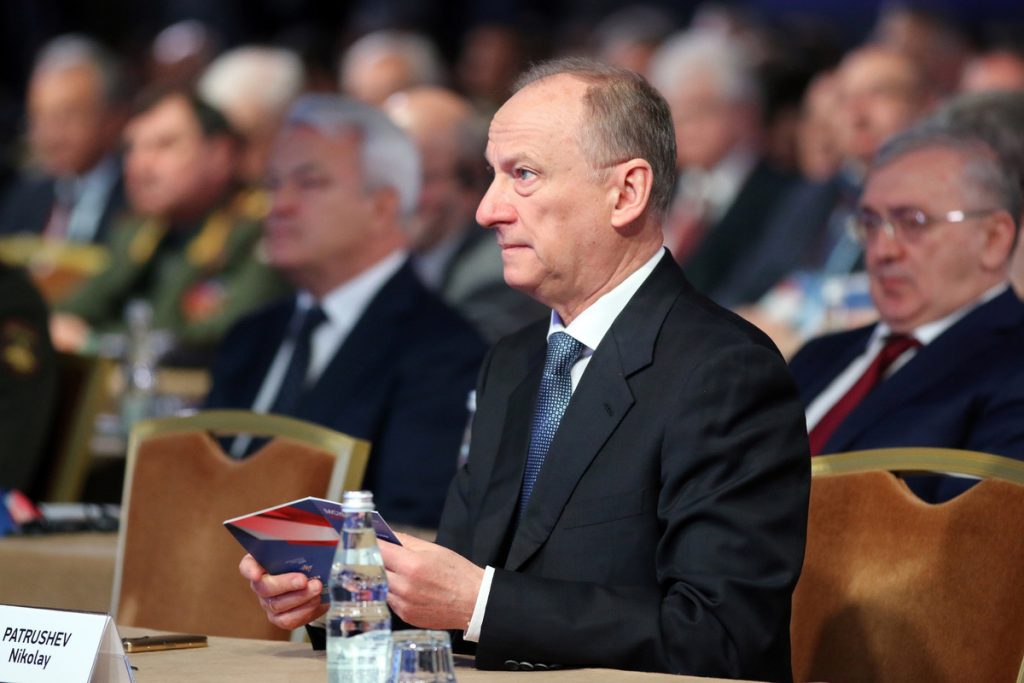
On Tuesday, October 31, Secretary of the Security Council of the Russian Federation Nikolai Patrushev, during a working visit to Tomsk, held a meeting on current national security issues in Siberia. According to official information, during the meeting, economic security issues were discussed in connection with increasing sanctions pressure from the United States and its allies. Particular attention was also paid to additional measures to ensure the technological sovereignty of Russia using the scientific and production potential of the Siberian regions.
The meeting was attended by the Presidential Plenipotentiary Representative in the Siberian Federal District, Anatoly Seryshev, heads of Siberian regions, and representatives of federal ministries and departments.
Key theses:
- Patrushev: “The United States, using the Ukrainian crisis, achieved a severance of economic relations between Europe and Russia and the elimination of economic competitors. They solve their economic problems at the expense of other countries. And so that Europe could not receive gas from Russia, the Nord Streams were blown up.”
- Patrushev: “They act in exactly the same way in Ukraine, where they provoked a “coup d’etat”, condoned the inculcation of neo-Nazi ideology, turned Ukraine into a testing ground for military-biological experiments, turned a blind eye to the murders of the civilian population of Donbas and prepared for military action against our country. Under these conditions, Russia stood up to protect the population of Donbas and did not allow aggressive plans to be implemented.”
- Patrushev: “Representatives of NATO countries are already openly saying that Russia prevented them from approaching its borders, and the Ukrainians are an instrument for the West to contain Russia.”
- Patrushev: “In connection with such actions, the credibility of the United States and the countries of the collective West has been exhausted.”
Outcomes and outlook:
Patrushev’s statement came against the backdrop of statements by representatives of some Baltic states who demand that the NATO leadership close the Baltic Sea to Russia and turn it into a “NATO internal sea” based on the fact that Russia poses a danger to the gas pipelines existing in the region. Russia decided to show that the main threat in the region comes not from itself but from the United States to which Patrushev’s statements were made. It is clear that this statement will not have any legal consequences, but it will not add constructiveness to relations between the United States and Russia, which are at a level close to zero.

